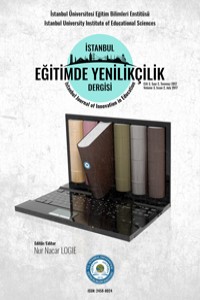Abstract
The 21st century sense of education, which embraces the idea that learning is a lifelong activity, places the learner at the center of the education process and defines it as the actor of this process. In the first place, as a social individual, the learner needs to express himself\herself at where he\she has been living as a course of his\her nature. Especially the base of foreign language learning stands on the individual’s need to communicate with a language besides of mother his\her mother language. On the other hand, speaking is the most difficult one of the four basic skills in foreign language education. The ability of a language user to express his / her thoughts, opinions and intentions is not only limited by lexicology and grammatical rules, but also requires managing the language appropriately for the context in real communication situations through pragmatic ability related to directing social relations. This ability can only be improved by frequent use of the language that is being learned in daily communication situations. There is no possibility of transferring lots of word patterns and the structural information to the dimension of natural communication in the countries like Turkey which the language being taught is not used out of the educational environment. Therefore, this study aims to examine the ability of Turkish students, who are learning French as a foreign language in Turkey, to transfer their linguistic knowledge that they acquired using the virtual interaction processes in the classroom environment. In this framework, an answer will be looked for the question of ‘Are the achievements that are specified as standard?’ by Common European Framework of Reference For Languages, which puts the learner into the center of the learning process and adopts an goal-oriented language approach also possible with the activities in the method books devoted to foreign language education?
References
- Bourguignon, C. (2006). De l’approche communicative à l’approche communic’actionnelle : une rupture épistémologique en didactique des languescultures. Synergie Europe, 1, pp. 58-71.
- Conseil de l’Europe. (2001). Un cadre europeen commun de réference pour les langues : Apprendre, enseigner, evaluer, Paris : Éditions Didier.
- Grice, H. P. (1975). Logic and Conversation. Dans P. Cole & J. L. Morgan (Dir.), Speech acts (pp. 41-58). New York : Academic Press.
- Puren, C. (2004). L’évolution historique des approches en didactique des langues-cultures, ou comment faire l’unité des unités didactiques. Dans Le nouveau bulletin de l’ADEAF, n° 89, avril 2005, pp. 40-51. Accessible en ligne : https://www.christianpuren.com/mes-travaux/2004c/
Abstract
Öğrenmenin yaşam boyu süren bir etkinlik olduğu görüşünü benimseyen 21. yüzyıl eğitim anlayışı, öğreneni eğitim sürecinin merkezine konumlandırarak onu, bu sürecin aktörü olarak tanımlamaktadır. Her şeyden önce sosyal bir birey olan öğrenen, doğası gereği yaşadığı çevrede kendini ifade etme gereksinimi duyar. Özellikle yabancı dil öğreniminin temeli, bireyin ana dili dışındaki bir dille iletişim kurma gereksinimine dayanır. Buna karşın, yabancı dil eğitiminde dört temel beceriden kazanımı en güç olan, konuşma becerisidir. Dil kullanıcısının düşünce, görüş ve niyetini aktarabilme yetisi yalnızca sözcük bilgisi ve dil bilgisi kurallarıyla sınırlı olmayıp, dili, gerçek iletişim durumlarında, bağlama uygun yöneterek sosyal ilişkilere yön verebilmeye ilişkin edimbilimsel yetiyi de beraberinde gerektirmektedir. Bu yeti ise ancak öğrenilmekte olan dilin günlük iletişim durumlarında sıklıkla kullanımıyla geliştirilebilir. Türkiye gibi öğrenilmekte olan dilin eğitim ortamı dışında kullanılmadığı ülkelerde öğrenenin edindiği pek çok söz kalıbı ve yapısal bilgiyi doğal iletişim boyutuna aktarabilme olanağı yoktur. Buna bağlı olarak bu çalışma, Türkiye’de Fransızcayı yabancı dil olarak öğrenen Türk öğrencilerin sınıf ortamındaki sanal etkileşim süreçleriyle edindikleri dilsel bilgileri özgün kullanıma aktarabilme yetilerini incelemeyi hedef almaktadır. Bu çerçevede öğreneni, öğrenme sürecinin merkezine yerleştiren ve eylem odaklı bir dil eğitimi yaklaşımını benimseyen ‘Diller İçin Avrupa Ortak Başvuru Metni’nce standart olarak belirtilen kazanımlar, yabancı dil eğitimine yönelik yöntem kitaplarındaki etkinliklerle mümkün müdür sorusuna yanıt aranacaktır.
References
- Bourguignon, C. (2006). De l’approche communicative à l’approche communic’actionnelle : une rupture épistémologique en didactique des languescultures. Synergie Europe, 1, pp. 58-71.
- Conseil de l’Europe. (2001). Un cadre europeen commun de réference pour les langues : Apprendre, enseigner, evaluer, Paris : Éditions Didier.
- Grice, H. P. (1975). Logic and Conversation. Dans P. Cole & J. L. Morgan (Dir.), Speech acts (pp. 41-58). New York : Academic Press.
- Puren, C. (2004). L’évolution historique des approches en didactique des langues-cultures, ou comment faire l’unité des unités didactiques. Dans Le nouveau bulletin de l’ADEAF, n° 89, avril 2005, pp. 40-51. Accessible en ligne : https://www.christianpuren.com/mes-travaux/2004c/
Details
| Primary Language | Turkish |
|---|---|
| Journal Section | ARTICLES |
| Authors | |
| Publication Date | July 2, 2017 |
| Published in Issue | Year 2017 Volume: 3 Issue: 2 |


